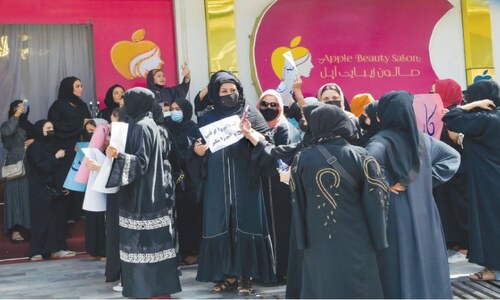A day after delivering the annual Nelson Mandela lecture where she said that the rulers of Afghanistan had virtually made it a crime to be a girl, Nobel laureate Malala Yousafzai called on all countries of the world not to normalise ties with Afghanistan and “make sure that they stand by Afghan women”.
Her Johannesburg speech had focused on the numerous decrees restricting girls’ and women’s rights“, especially the bans on secondary and university education, that the interim Afghan Taliban government has imposed.
Deriving from the crime of apartheid, she had called for the term “gender apartheid” to be recognised as a crime against humanity and criminalised at the international level.
The activist had urged international actors — including governments, conference organisers, and UN officials — to “resist normalising relations with the Taliban”.
Speaking to Dawn.com, Malala said, “I would request Pakistan to make sure that they stand by the Afghan women’s side.”
When asked about how she thinks Pakistan should proceed ahead its relations with its neighbour, she said: “My message to all countries, including Pakistan, is that they should not normalise relationships with Afghanistan and [not] completely ignore the gender apartheid that is happening there.”
Citing Talibanisation and extremism in the Swat valley from 2007-2009, the Nobel Peace Prize winner said it was especially important for Pakistan “to take a stand here because it also puts a risk to the women in Pakistan as well”.
She highlighted the importance of Pakistan “using its role to build pressure on the Taliban to make sure that the protection of girls’ rights and women’s rights […] are non-negotiable conditions in any conversation”.
Malala clarified that she was not saying Pakistan “should not have a dialogue” or negotiations, but that it was “really critical” that the conversations prioritised the voices of Afghan women and girls.
Deportation ‘taking away education’ from Afghan girls
In October, Malala had echoed the United Nations call and urged Pakistan to “reconsider its rushed policy of mass deportation” of undocumented immigrants, the majority of whom are Afghans.

Speaking to Dawn.com, the activist said she was “deeply heartbroken by Pakistan’s recent decision” which would have many families deported back to Afghanistan, including those who “recently escaped from the oppression of the Taliban”.
Malala stated she was “deeply concerned” about Afghan girls being sent back to Afghanistan because of the bans on education placed there.
“Pakistan is actually not only displacing them, but it is also taking away education and other rights away from them,” she asserted.
The UN’s Messenger of Peace further said that a lot of the women being displaced were women activists who were “facing threats and needed safety and security”.
“At the same time, it also includes families who have been living in Pakistan for more than 20-30 years and it includes children and young people who were born in Pakistan.”
Malala said it was “important for Pakistan to understand its role as a neighbouring country, but also the commitments it has made at the international level”.
‘12m girls out of school in Pakistan’
Speaking about the education situation in Pakistan, Malala highlighted there were about 12 million girls currently out of school countrywide.
When asked about the biggest hurdles facing Pakistani girls in receiving secondary and higher education, the young activist said the reasons vary but expressed the belief that the issues “start at the policy level”.
Emphasising the need to make sure that the Constitution “guarantees 12 years of education to every child”, she said it was “important to support the activism of local organisations that are doing a lot of work in raising awareness” about girls’ education.
Malala stated that not only does education help a girl decide her future but also improves the economy, helps sustain peace, mitigates climate change and reduces extreme poverty.
“If we want to ensure that Pakistan is becoming a more climate-resilient country, it is tackling extreme poverty and it is tackling the issue of gender discrimination, we have to prioritise girls’ education.”
Responding to a question about tackling the issue of some political and governmental leaders being averse to women raising their voices, Malala reiterated the need for laws that protect women and accountability for those violating them.
The Nobel laureate said she was “really proud of the work that organisations in Pakistan are doing for women’s equality”.
“And to some people, it may not actually be clear but when we talk about the issues that women face, it includes harassment, it includes sexual violence, it includes beating and even honour-killing,” Malala said.
“We cannot live in a country where women feel that they are threatened and they are not safe.”
An abridged version of this interview was published in Dawn on Dec 7.
















































Dear visitor, the comments section is undergoing an overhaul and will return soon.